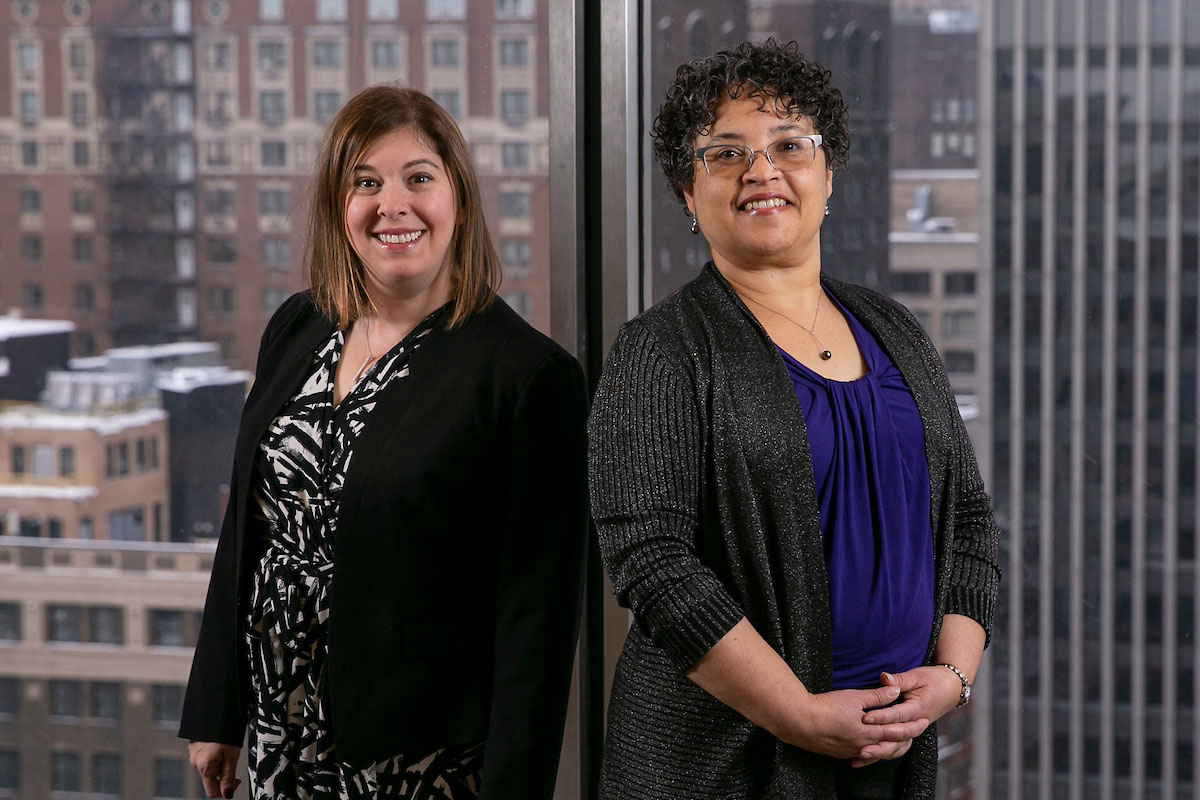 Alyssa Westring, left, and Christina Rivers have been named inaugural Presidential Fellows and will address diversity and inclusion issues during their one-year term beginning in fall 2019. (DePaul University/Jamie Moncrief)
Alyssa Westring, left, and Christina Rivers have been named inaugural Presidential Fellows and will address diversity and inclusion issues during their one-year term beginning in fall 2019. (DePaul University/Jamie Moncrief)
When he created the new Presidential Fellows program last fall, DePaul President A. Gabriel Esteban sought to move the university closer to its vision as a place where all faculty, staff and students are affirmed, feel included and have equal access to opportunities to achieve their goals.
The appointment of Christina Rivers, associate professor of political science, and Alyssa Westring, associate professor of management and entrepreneurship, as the inaugural Presidential Fellows will bring that vision to life. Rivers will launch an intense effort for diverse faculty and students to form strong bonds through research and a post-prison higher education initiative. Westring will evaluate DePaul’s culture to identify opportunities to enhance the engagement, retention and career advancement for women and faculty of color.
The American Council on Education fellowship program served as a model for the program at DePaul, according to Dr. Esteban.
“This year we decided not to host an ACE Fellow, and in making that decision, we were prompted to consider what a fellow would bring to DePaul and how such an experience would benefit the institution and the fellow,” he says.
In addition to fostering a welcoming climate, the strategic plan,
“Grounded in Mission,” recommends actions that nurture a sense of inclusion and strategies that will attract, retain and ensure the success of diverse faculty, staff and students. This includes integrating diverse perspectives and topics into courses and appreciating differing viewpoints and ways of thinking.
“This program creates an opportunity for faculty to lend their scholarly expertise to helping DePaul achieve specific objectives articulated in our strategic plan, and allows faculty to be exposed to university administration in a way that helps build capacity in our future leaders,” Dr. Esteban says.
Rivers joined DePaul 18 years ago and directs DePaul’s Center for Black Diaspora. She applied to be a Presidential Fellow to fuse her interests in diversity with her service-oriented research and reconfigure it to benefit DePaul.
“I’d like to investigate creating a cohort of incoming underrepresented students matched with faculty of similar interest with stronger connections than existing programs,” she says. “The goal would be to get students thinking about research and encourage them to pursue their PhDs and become future instructors in higher education.”
Her other project builds on her work with DePaul’s Inside-Out Prison Exchange Program and the Illinois Consortium of Higher Education in Prison. She notes many universities teach prisoners, but few recruit formerly incarcerated students upon their release. They are a marginalized population.
After teaching several classes in Stateville Correctional Center, Rivers has seen students in jail outperform students in traditional classrooms.
“They can be phenomenal students,” she says. “I have seen extraordinary intellect and potential for scholarship. It is a pool left sitting.”
Rivers is working on a new edited volume on the politics of mass incarceration that will address such issues as suppression of voting by jailed individuals who retain their right to vote; laws that disenfranchise - sometimes permanently - those with felony convictions; and the practice of counting incarcerated individuals in electoral districts even though they cannot vote and are not considered constituents.
Westring, who has been at DePaul for 11 years and won an Excellence in Teaching Award in 2017, has attracted more than $500,000 in grant funding. She will build on her National Institutes of Health-funded research advancing the academic careers of women and faculty of color.
That research includes a project at the University of Pennsylvania’s School of Medicine where she created a culture assessment widely applicable to diverse faculty, staff and students. It evaluates environments based on equal access to resources and opportunities; support for work-life integration; awareness and dialogue about unconscious bias; and leader engagement and advocacy.
“I wanted to take what I’ve learned and bring it to my institution to make it better for everyone,” Westring says of her decision to apply for the Presidential Fellows program. “This is a challenge when leaders talk a good game, but don’t walk the talk. When I met with Dr. Esteban, I felt like he gets it. He said ‘we can’t just say these are our values.’”
Westring has a forthcoming book that empowers working parents to think and act like leaders in order to create greater harmony among the different areas of their lives.
The fellows will work closely with Dr. Esteban, the provost and the Office of Institutional Diversity and Equity. Elizabeth Ortiz, vice president of OIDE, is excited about the fellows, whose appointments will stretch the full 2019-20 academic year.
“They will be partners in developing new diversity and inclusion initiatives, while helping evaluate existing programs,” Ortiz says. “Their research will enable us to work on student success and create more supports to retain our faculty.”